|
|
|
Sort Order |
|
|
|
Items / Page
|
|
|
|
|
|
|
| Srl | Item |
| 1 |
ID:
065432
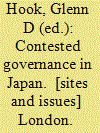

|
|
|
|
|
| Publication |
London, routledgeCurzon, 2005.
|
| Description |
xxiv, 263p.
|
| Series |
Sheffield centre for Japanese studies/RoutledgeCurzon series
|
| Standard Number |
0415364191
|
|
|
|
|
|
|
|
|
|
|
|
Copies: C:1/I:0,R:0,Q:0
Circulation
| Accession# | Call# | Current Location | Status | Policy | Location |
| 050096 | 320.952/HOO 050096 | Main | On Shelf | General | |
|
|
|
|
| 2 |
ID:
049770


|
|
|
|
|
| Publication |
London, Routledge, 2001.
|
| Description |
xxxvi, 532p.
|
| Standard Number |
0415240972
|
|
|
|
|
|
|
|
|
|
|
|
Copies: C:1/I:0,R:0,Q:0
Circulation
| Accession# | Call# | Current Location | Status | Policy | Location |
| 044590 | 327.52/HOO 044590 | Main | On Shelf | General | |
|
|
|
|
| 3 |
ID:
131331
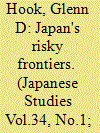

|
|
|
|
|
| Publication |
2014.
|
| Summary/Abstract |
This article investigates Japan's current role in the Senkaku Islands. The government maintains administrative control of these tiny, uninhabited islands and rocks at the frontier of Japan, but both the governments of China and Taiwan dispute Japanese claims to sovereignty and claim sovereignty over the islands themselves. Whilst much of the extant literature examines these competing claims, this article instead explores the relationship between risk, sovereignty and governance at the frontiers of Japan. It seeks to demonstrate in particular how the governance of Japan's maritime frontiers reflects a broader process of the recalibration of risk by the Abe Shinz? government as part of ending the postwar regime. Its main purpose is twofold: first, to illuminate how the government carries out administrative control and governance of a remote, uninhabited territory when sovereignty is challenged and in dispute; and second, to elucidate how the government's recalibration of risk generates a range of costs for the Japanese market and society as a result of the deterioration of relations with China arising from the way risk is being recalibrated.
|
|
|
|
|
|
|
|
|
|
|
|
|
|
|
|
| 4 |
ID:
006031
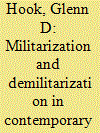

|
|
|
|
|
| Publication |
London, Routledge, 1996.
|
| Description |
xv,256p.
|
| Standard Number |
0415022746
|
|
|
|
|
|
|
|
|
|
|
|
Copies: C:1/I:0,R:0,Q:0
Circulation
| Accession# | Call# | Current Location | Status | Policy | Location |
| 037799 | 355.00952/HOO 037799 | Main | On Shelf | General | |
|
|
|
|
| 5 |
ID:
112950
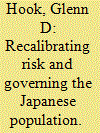

|
|
|
|
|
| Publication |
2012.
|
| Summary/Abstract |
This article examines how the Japanese state recalibrates the risks Japanese nationals face when traveling outside of Japan's sovereign territorial boundaries. The author elucidates the measures the state takes to assist its nationals deal with the range of risks they are likely to encounter when traveling to another sovereign state or territory. The article focuses on how the Ministry of Foreign Affairs communicates travel advice and warnings on "risky" destinations and how the state's recalibration of risk aims to inculcate "self-responsibility" as a norm in governing the Japanese population.
|
|
|
|
|
|
|
|
|
|
|
|
|
|
|
|
| 6 |
ID:
119067
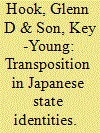

|
|
|
|
|
| Publication |
2013.
|
| Summary/Abstract |
This article aims to illustrate the trajectory of Japan's security identity transposition. As one of the catalysts in identity transposition, it focuses on the constitutive roles of norms regulating Japan's overseas dispatches of the Self-Defense Forces (SDF). Whilst keeping the identities of 'a peace state' and 'a civilian power', the authors argue that Japan has crafted a new security identity after the end of the cold war and the 9/11 terrorist attacks-namely, 'an international humanitarian power'. As evidence of this transposition, the authors illustrate a dramatic increase in the number of overseas SDF dispatches on humanitarian missions, and the shift of domestic and foreign responses to it. The authors note that Japan has been on the road to remilitarisation and internationalisation during the past four decades through the enactments of laws for overseas SDF dispatches, the general public's shift of attitude on the SDF's roles, the evolution of the alliance in a more operational direction, and the creation of threats from North Korea and China. Lastly, the authors argue that there is still a long way to go before Japan emerges as a normal state because of the presence of many domestic and structural barriers, especially multiple identities defining the Japanese state.
|
|
|
|
|
|
|
|
|
|
|
|
|
|
|
|
|
|
|
|
|